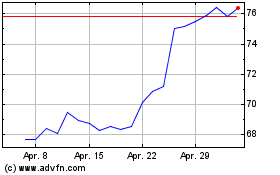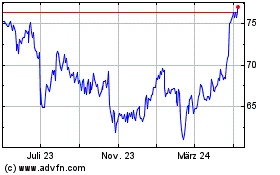By Jenny Strasburg and Giovanni Legorano
Danish and Norwegian health officials temporarily halted the use
of the Covid-19 vaccine made by AstraZeneca PLC as a precaution, as
they and other European regulators investigated reports of severe
blood clots in people who have received doses.
Millions of doses of the shot have been administered across the
continent. Europe's top medicines watchdog said this week it hadn't
found instances of serious blood clots to be more common among
people who got the AstraZenica vaccine than in the general
population.
Still, the Danish Health Authority said Thursday it would pause
for at least two weeks the use of the AstraZeneca vaccine, jointly
developed with the University of Oxford. That includes for people
who have already had their first dose of the two-dose vaccine.
Danish officials cited an unspecified number of reports of
severe cases of blood clots in people who received the vaccine,
including one person in Denmark who died. "It cannot be concluded
whether there is a link between the vaccine and the blood clots,"
the Danish health authority said. Norway cited Denmark's decision,
saying it also doesn't have evidence to connect the health
incidents to vaccination but was acting out of caution to halt use
of the AstraZeneca vaccine.
Danish authorities said the European Medicines Agency -- which
acts much like the Food and Drug Administration in regulating
medicine across the European Union -- is investigating other,
similar reports and any possible connection to the vaccine.
The European regulator said Wednesday that it was investigating
several cases of multiple thrombosis, or the formation of blood
clots within blood vessels, and similar conditions in people
post-vaccination. It said there were 22 reported cases of
"thromboembolic events" among three million people vaccinated with
the AstraZeneca shot across the 27-member bloc as of March 9. That
rate of serious blood clots is in line with typical levels for the
general population, it said.
The relationship between Europe and AstraZeneca has been rocky
since even before the vaccine gained regulatory authorization in
the bloc. Several countries initially restricted the vaccine's use
to younger adults but in some cases later changed course.
AstraZeneca is falling short of projected deliveries to the bloc
and trying to catch up, angering European leaders already under
fire for the slow pace of their rollouts.
More than 11 million doses of the vaccine have been given in the
U.K., government figures show. Documented reactions to the vaccine
have been largely mild or moderate and have included soreness in
the arm near the injection, tiredness, fever and headache,
typically not lasting more than a few days.
The U.K.'s medicines regulator urged people to continue
receiving the AstraZeneca vaccine, calling the Danish decision to
suspend use of the shot a "precautionary measure." The U.K.
regulator said there was no confirmation of a link between blood
clotting and the vaccine.
The U.K. hasn't seen "excess reports," or higher-than-expected
incidents, of blood clots among people who have been vaccinated
with the AstraZeneca-Oxford vaccine or another made by Pfizer Inc.
and BioNTech SE, according to Prof. Anthony Harnden, deputy chair
of the U.K.'s primary independent committee advising the government
on its vaccine rollout.
Other researchers said Thursday blood-clotting conditions
regularly go undiagnosed, and that the rate of serious clotting
reported among Europeans who have been vaccinated wasn't out of
typical proportion or a cause of concern. Also, some scientists
said the risks of severe blood clots from serious Covid -- a known
symptom in some cases -- could be worse than potential risks from
vaccination itself.
Denmark said it wasn't giving up on the vaccine. "It is
important to emphasize that we have not opted out of the
AstraZeneca vaccine, but that we are putting it on hold. There is
good evidence that the vaccine is both safe and effective," said
the Danish Health Authority.
A spokesman for U.K.-based AstraZeneca said Thursday that
"patient safety is the highest priority," adding that regulators
require stringent efficacy and safety standards for vaccines. "The
safety of the vaccine has been extensively studied in phase-three
clinical trials and peer-reviewed data confirms the vaccine has
been generally well tolerated," he said.
Over the weekend, Austrian authorities said they suspended the
use of one batch of Covid-19 vaccine from AstraZeneca as a
precautionary measure after reports of one death and an illness
among vaccine recipients that haven't been shown to be linked to
the vaccine. Austria didn't halt use of the vaccine broadly, aside
from that batch.
The batch contained 1 million doses and was doled out among 17
countries. Four countries besides Austria stopped using doses from
the same batch as of Wednesday, according to the European medicines
regulator.
Italy said Thursday it, too, was discontinuing the use of a
different batch of the vaccine as a precaution, a move made after
two people died after receiving doses, said a person familiar with
the matter. Italy's medicines watchdog said it had no evidence that
any serious health conditions were connected to the vaccine. The
country still recommends the vaccine, and is trying to increase
inoculations, which have been slow and uneven across different
parts of the country.
The death cited by Austrian authorities was from severe
coagulation disorders in a 49-year-old woman, Austria's Federal
Office for Safety in Health Care said Sunday. Separately a
35-year-old woman developed a pulmonary embolism and is recovering,
the agency said. Both women received shots in the country's Zwettl
district from the same batch of vaccine, but no connection has been
shown to the vaccine, the agency said Sunday.
"Currently, there is no evidence of a causal relationship with
vaccination," the agency said in a statement on its website, adding
that the health conditions aren't among known or expected side
effects of the vaccine. The agency said that investigations are
under way "to be able to completely exclude a possible
connection."
The Austrian authorities said they haven't found the two women's
conditions or similar blood clotting noted anywhere else in any
side effect reports related to the vaccine internationally.
AstraZeneca said it was supporting the investigation.
--Dominic Chopping contributed to this article.
Write to Jenny Strasburg at jenny.strasburg@wsj.com and Giovanni
Legorano at giovanni.legorano@wsj.com
(END) Dow Jones Newswires
March 11, 2021 13:13 ET (18:13 GMT)
Copyright (c) 2021 Dow Jones & Company, Inc.
AstraZeneca (NASDAQ:AZN)
Historical Stock Chart
Von Sep 2024 bis Okt 2024

AstraZeneca (NASDAQ:AZN)
Historical Stock Chart
Von Okt 2023 bis Okt 2024
